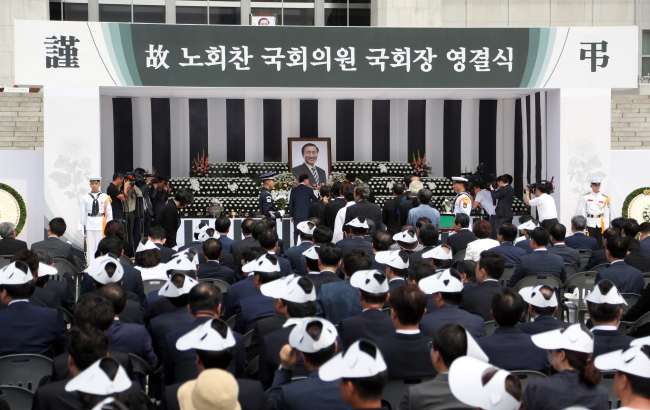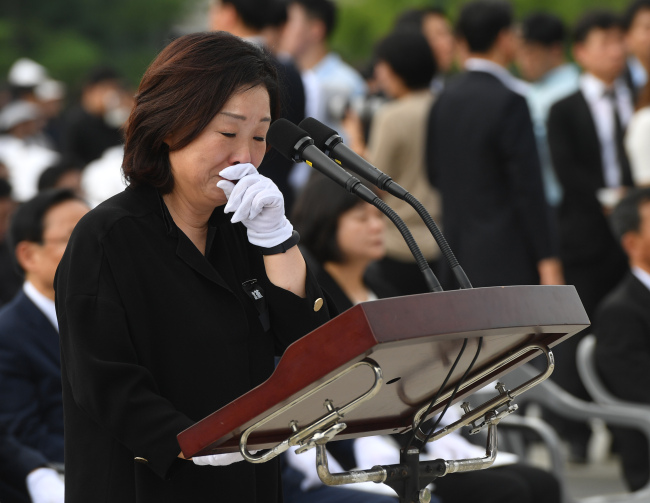Thousands gathered to bid farewell to the late politician Roh Hoe-chan of the Justice Party in a ceremony at the National Assembly on Friday.
Amid scorching heat that reached 33 degrees Celsius at 10 a.m., lawmakers, families and supporters stood at Jeonghyungwan in front of the National Assembly building to pay their last respects to the iconic liberal lawmaker.
Amid scorching heat that reached 33 degrees Celsius at 10 a.m., lawmakers, families and supporters stood at Jeonghyungwan in front of the National Assembly building to pay their last respects to the iconic liberal lawmaker.

“You were a just man. You had progressive values and have been a symbol of liberal politics,” National Assembly Speaker Moon Hee-sang said in his speech.
“You stop here but the values and spirit you have promoted will continue forward.”
The three-term lawmaker and floor leader of the minor opposition Justice Party was found dead in front of his mother’s apartment building in an apparent suicide Monday, amid allegations that he received illegal political funds.
Roh had been suspected of receiving 50 million won ($44,300) in 2016 from a lawyer who is currently being investigated by an independent counsel team as one of the key figures behind an online political opinion-rigging scandal. In a note he left behind, he admitted to having received the money, but added it was not related to illicit solicitation.
Sim Sang-jeung, the party’s former chairwoman, could not hide her tears at the ceremony.
“Roh Hoe-chan, my colleague, my forever loving colleague. Why am I reading the funeral speech to you right now? I do not want to,” Sim lamented in her speech.
Recalling the 30 years she had worked with Roh as labor activists, Sim vowed to become stronger and continue to promote the values of liberal politics.
"In the history of liberal politics we face the many failures, only to stand back up again together. I was able to go through that because you were there," Sim said.

“Men and women of all ages hold my hands to tell me the same thing. ‘Roh was a person who was needed in Korean society.’ There would not be a better way to describe him,” said Lee Jeong-mi, chairwoman of the Justice Party.
When a video commemorating Roh was aired, playing the recorded song “Soyeonga” sang by Roh, many participants were seen wiping their tears with handkerchiefs. Roh had wrote music and gave the name “Soyeonga” to an essay written by the late poet Seo Jeong-joo.
Over the death of Roh, who was popular for his devotion to the rights of those who are less represented in society, thousands from various sectors expressed condolences during the five-day mourning period.
According to the Justice Party, more than 72,300 visitors have paid tribute to Roh since an altar was set up at the Severance Hospital in Sinchon and memorial altars were installed in 39 regions across the nation.
Many supporters at the scene also expressed sorrow.
Woo Jeong-hwa, 22, recalled Roh as a politician who had strived to speak for those who are less represented in society.
“I do not know him personally, but he was one of the few politicians I respected for his great efforts to help the people facing difficulties in society. I am regretful over his unexpected death,” said Woo.
“I learned about Roh from his speeches through television and radio programs. I think he was a figure who set the principles for justice,” Choi Eun-sook, 49, told The Korea Herald. She took the day off work to come from Anseong, Gyeonggi Province, with her son and husband.
Kwon Young-jin, who traveled from Wando, South Jeolla Province, with his wife and young daughter could not finish his sentences, as he was in tears when asked about his memories with Roh.
“We worked with Roh a long time ago, as members of the Democratic Labor Party. We wanted to properly bid farewell,” Kwon’s wife, Seo Kyung-hee said. They came a day before to participate in the memorial ceremony.
Roh was buried in Maseok Moran Cemetery located in Namyangju, Gyeonggi Province, on Friday afternoon.
Roh was born in Busan in 1956 and worked as a labor activist before entering politics as a proportional representative of the Democratic Labor Party in 2004. He participated in the founding of the Unified Progressive Party and was elected as a lawmaker representing the Nowon-C district in Seoul in 2012.
In October 2012, he defected to create the Justice Party, and was elected for his third term at the National Assembly to represent Seongsan District in Changwon, South Gyeongsang Province, in 2016. He had since been the floor leader of the Justice Party.
By Jo He-rim (herim@heraldcorp.com)




![[Herald Interview] 'Amid aging population, Korea to invite more young professionals from overseas'](http://res.heraldm.com/phpwas/restmb_idxmake.php?idx=644&simg=/content/image/2024/04/24/20240424050844_0.jpg&u=20240424200058)













![[KH Explains] Korean shipbuilding stocks rally: Real growth or bubble?](http://res.heraldm.com/phpwas/restmb_idxmake.php?idx=652&simg=/content/image/2024/04/25/20240425050656_0.jpg&u=)

